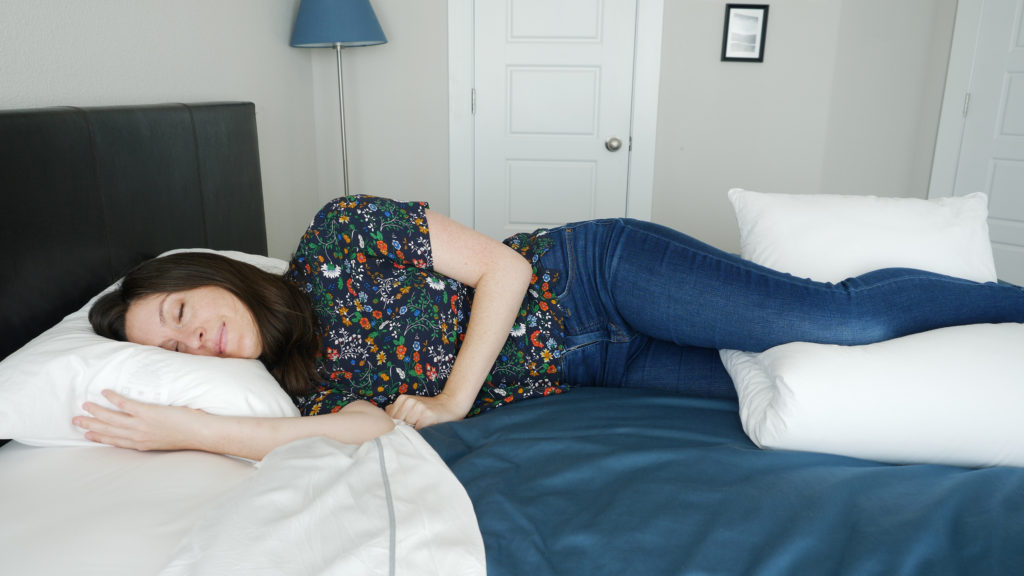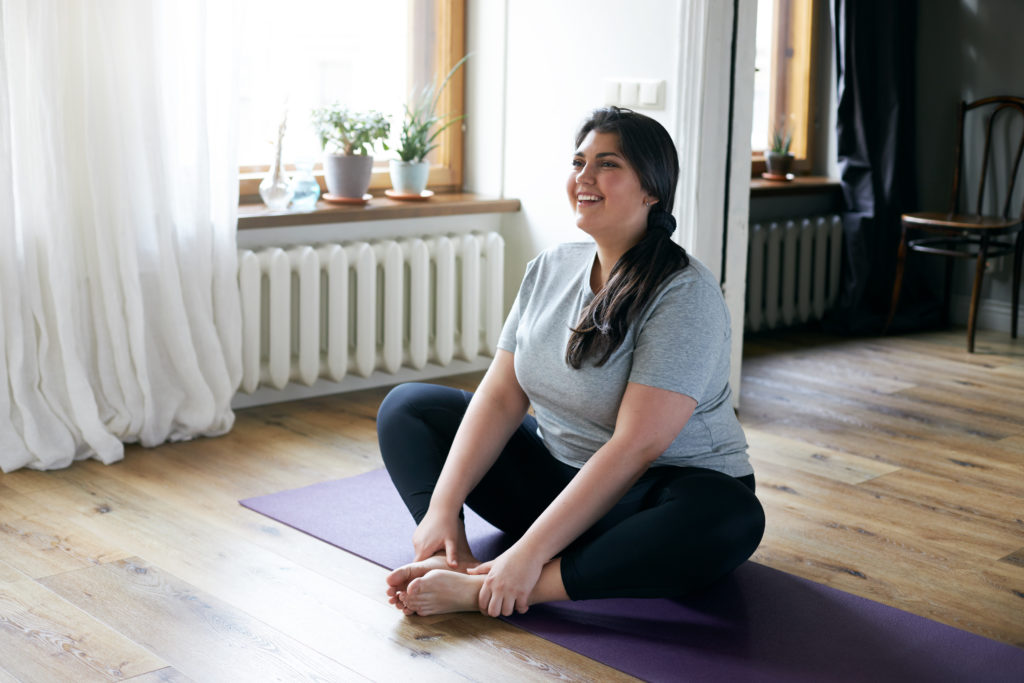How To Sleep With Hip Pain
Simple and Practical Ways to Alleviate Nighttime Hip Pain
If you’ve been struggling with hip pain, you might might be finding it difficult to sleep comfortably. But don’t let joint pain and aches get in the way of the rest we all need! We are here to help with a number of simple and practical ways to alleviate nighttime hip pain and keep you well rested.
Dealing With Hip Pain At Night
For those who battle chronic hip pain, there are a number of strategies that can provide comfort and pain relief throughout the night, making it possible to enjoy a more peaceful, restorative night’s sleep.
Adjust Your Sleeping Position
The hip is a sensitive pressure point. If you place too much weight on it, it may increase your feelings of stiffness or soreness. For those who have hip pain on just one side of their body, side sleeping can be a good option; just be sure to sleep on the opposite side (so, if your left hip is what’s hurting you, put your weight on the right one). An even better option is to sleep on your back, which keeps either of your hips from bearing too much strain. A knee pillow can also be used to ensure proper hip alignment.
Use Pillows to Your Advantage
Pillow placement can be a crucial way to ease the weight on sore, tender hips, helping to alleviate pain. For back sleepers, in particular, a wedge-shaped pillow can be placed under the lower back or below the knees. This helps slightly elevate the hips and reduce the pressure placed on them. For side sleepers, a pillow can be placed under or between the knees. Again, the aim is simply to ensure the sensitive hip isn’t pushed into the mattress, and that it isn’t under too much pressure. If you don’t have a pillow that’s the correct size, even a folded-up blanket or towel may work.

Ensure You Have the Correct Mattress
A pressure-relieving mattress can also be important. While there are many types of mattress that work well for pain relief, memory foam is often the best choice, as it allows the hip to sink into the mattress without getting bunched-up or jammed with pressure.
Something else to look for when searching for a pressure-relieving mattress is targeted or zoned support; mattresses with targeted ergonomic support are specifically designed to evenly distribute body weight, ensuring your sensitive hips don’t bear the brunt of it.
If you’re unable to get a new mattress, a mattress topper can help, adding a little additional padding to your current bed. This can be a great way to rehabilitate an older, used mattress and make it more hip-friendly.
Stretch Before Sleeping
Another way to alleviate hip pain is through some light stretching before bedtime. For example, consider a hip flexor stretch: Get into a lunge position, place your hands on your hips, and move your pelvis and torso forward until you feel the muscles stretching down in your hips.
Another helpful stretch is the butterfly stretch. Sit on the floor, bend your knees, and place the soles of your feet together. Bring your heels as close to your body as you can, and use your elbows to push your knees downward. These are just a couple of stretches that can help remove some of the pressure and tension in your hips, potentially helping you get comfortable before bedtime.

Dealing With Hip Pain During the Day
While the right nighttime habits are important, there are also some strategies that will allow you to minimize nighttime hip pain, starting earlier in the day. Use these tips to get a head start on pain management.
Get Good Exercise
Daily physical activity is recommended, but for those who live with hip pain, it’s important to choose your exercise carefully. High-impact activities, which can include running, jumping, or even hiking on rocky or uneven terrain, put a lot of strain on your joints, and can inflame hip pain. Low-impact, less strenuous exercises may be better. Try some basic stretching, like yoga; taking a moderately-paced walk; or swimming.
Maintain a Healthy Diet
Nutrition is another key component in reducing hip pain. For starters, eating a sound diet can help you lose weight, which leads to less pressure on your joints throughout the day. Nuts, seeds, colorful fruits, root vegetables, and whole grains all include nutrients that strengthen the joints. There are also certain foods that can help prepare your mind and body for sleep, such as fatty fish, nuts, rice, perhaps even a small glass of milk.

During the Workday
During your workday, good posture is key. When sitting, avoid crossing your legs; instead, make sure you have a chair that allows you to keep your hips, knees, and feet aligned. Keep your knees lower than your hips, potentially sitting on a cushion to help achieve this. Jobs that require standing all day can be tough on the joints, but taking breaks to sit down may help. Walking around, stretching, and changing positions may also help alleviate pain in the hip.
Common Causes of Hip Pain at Night
For those who struggle with chronic pain in their hips, there could be any number of potential causes. Three of the most common causes of nighttime hip pain include bursitis, osteoarthritis, and rheumatoid arthritis.
Bursitis
Your joints are surrounded by small, fluid-filled sacs, called bursae, which exist to cushion the joints from nearby bones and muscles. Bursitis is a condition in which these bursae become inflamed, something that tends to happen either near the elbow, shoulder, or hip.
Usually, the root cause of this condition is repetitive motion that places too much pressure on the joints. Tasks that involve kneeling (for example, to clean the floor) may cause bursitis of the hips, resulting in swollen joints, pain, and stiffness. Usually, bursitis will go away following a few weeks of rest from those high-pressure activities.
Osteoarthritis
Osteoarthritis is a condition that involves the erosion of cartilage, which normally provides an important cushion around bones and joints. This condition can lead to pain in any joint, but osteoarthritis of the hip can be especially disruptive to sound sleep.
Osteoarthritis is a “wear and tear” disease, usually brought on by age but possibly compounded by obesity or by joint injuries. The best way to treat the condition is to stay active, try to maintain a healthy body weight, and talk with a doctor about potential pain remedies. Note that, while the pain associated with this condition can be managed, the damage done to joints is irreversible.
Rheumatoid Arthritis
Rheumatoid arthritis is an autoimmune disease, which means the body attacks healthy cells as if they are foreign invaders. Specifically, rheumatoid arthritis affects the joints, and can cause severe and lasting hip pain. Stiffness, swelling, tenderness, and pain are all hallmarks of rheumatoid arthritis.
The specific causes of the disease are as yet unknown. However, risk for rheumatoid arthritis increases with age. Arthritis medications can help mediate the pain, and light exercise may also prove helpful.
Conclusion
Hip pain can happen for many different reasons, and often, one of its most serious effects is to disrupt your sleep patterns. Even chronic hip conditions can be managed through the right combination of healthy daytime habits and a smart bedtime routine, including the use of the right mattress and the correct sleeping position. A careful approach can lead to lasting hip pain relief, and to a greater likelihood of uninterrupted sleep.
-Andrew Warren, Mattressclarity